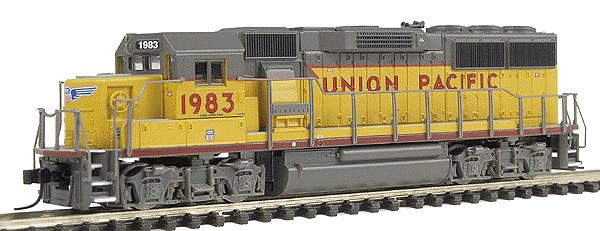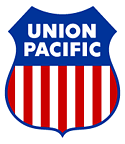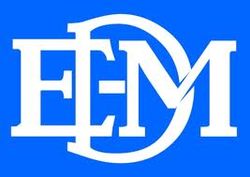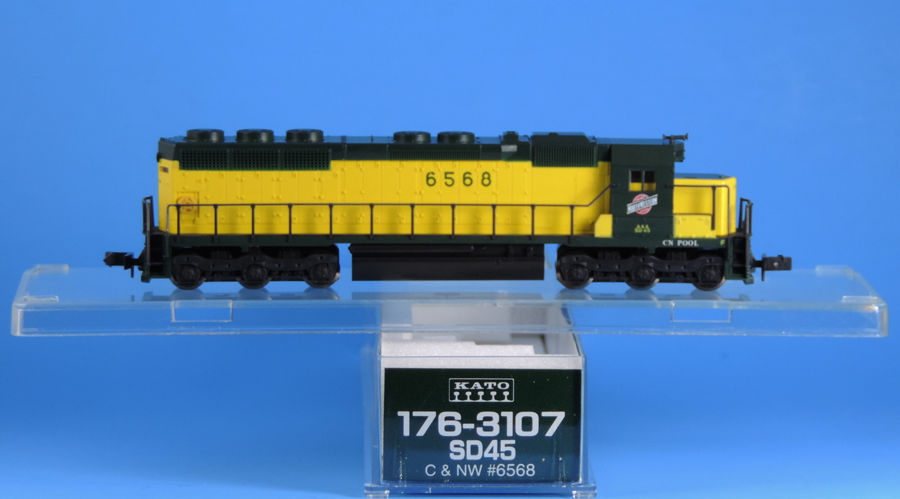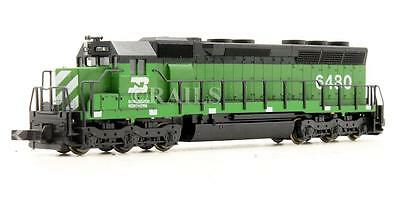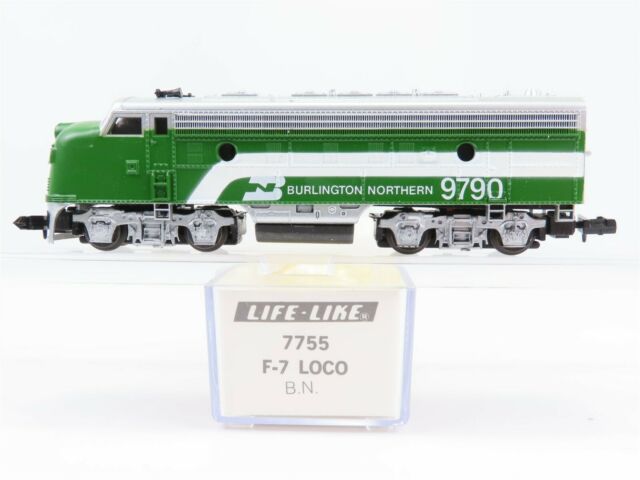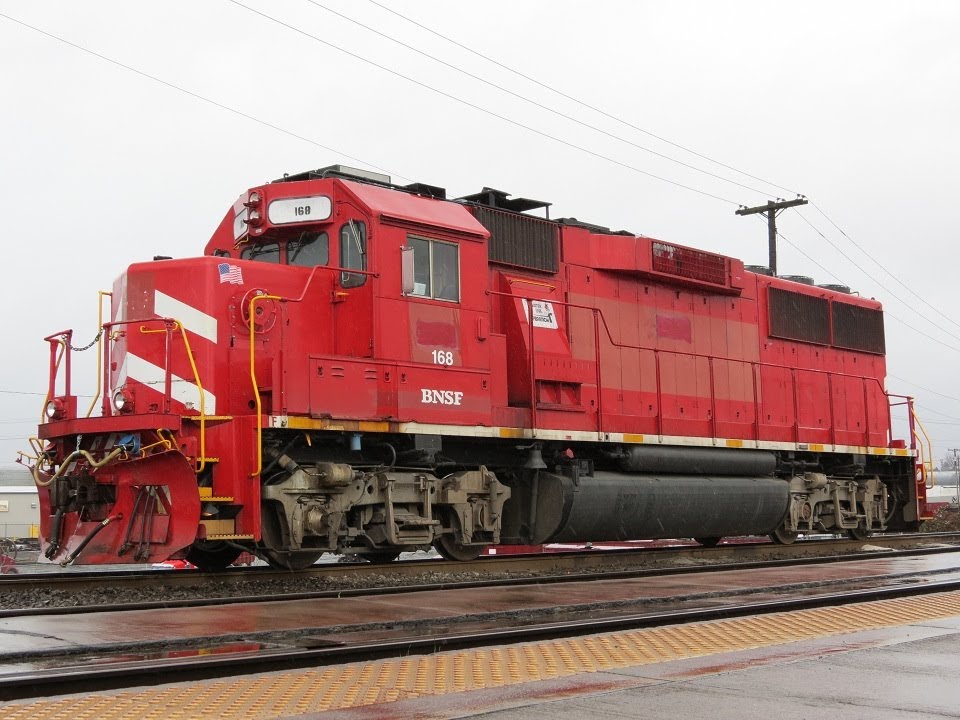Model Information: Life-Like introduced this model in 2004. The original version had no DCC capability. A new mechanism was swapped in in 2012 with appropriate DCC readiness. The detailing is quite nice and the performance is excellent in terms of quietness, smoothness, low-speed operation and pulling.
DCC Information: Anything designed for Life-Like's DCC-Ready GP20 will work (IE a Digitrax DN163L0A or a TCS L1D4).
Prototype History: An EMD GP60 is a 4-axle (B-B) diesel-electric locomotive built by General Motors Electro-Motive Division between 1985 and 1994. The GP60 was EMD's first engine that was classified as a "third-generation" locomotive. Hidden behind the electrical cabinet doors on the rear wall of the cab, the GP60 concealed a trio of microprocessors that monitored and managed a host of engine, cooling system and control functions. The engine's on-board microprocessors replaced hundreds of wiring circuits, dozens of relays and all but one module card, making it an improvement among EMD's engines.
Power was provided by a 16-cylinder 710G3A diesel engine, which could produce 3,800 horsepower (2,800 kW). This locomotive was 59 feet 9 inches long and featured a 3,700-US-gallon (14,000 L) fuel tank. The GP60 series shared the same frame as the GP59. Cabless 'B' units of this locomotive model were also built; they were known as GP60B models, purchased exclusively by the Atchison, Topeka and Santa Fe Railway. Units built with a wide/comfort/safety cab and a wide nose were designated GP60M and all purchased by the Santa Fe. A total of 294 GP60, 23 GP60B and 63 GP60M units were built by EMD. Due to the mainstream focus of railroads on powerful six-axle units, and strict emissions standards, the GP60 will most likely be the last new EMD "Geep".
From Wikipedia
Power was provided by a 16-cylinder 710G3A diesel engine, which could produce 3,800 horsepower (2,800 kW). This locomotive was 59 feet 9 inches long and featured a 3,700-US-gallon (14,000 L) fuel tank. The GP60 series shared the same frame as the GP59. Cabless 'B' units of this locomotive model were also built; they were known as GP60B models, purchased exclusively by the Atchison, Topeka and Santa Fe Railway. Units built with a wide/comfort/safety cab and a wide nose were designated GP60M and all purchased by the Santa Fe. A total of 294 GP60, 23 GP60B and 63 GP60M units were built by EMD. Due to the mainstream focus of railroads on powerful six-axle units, and strict emissions standards, the GP60 will most likely be the last new EMD "Geep".
From Wikipedia
Road Name History: The Union Pacific Railroad (reporting mark UP) is a freight hauling railroad that operates 8,500 locomotives over 32,100 route-miles in 23 states west of Chicago, Illinois and New Orleans, Louisiana. The Union Pacific Railroad network is the largest in the United States and employs 42,600 people. It is also one of the world's largest transportation companies.
Union Pacific Railroad is the principal operating company of Union Pacific Corporation (NYSE: UNP); both are headquartered in Omaha, Nebraska. Over the years Union Pacific Corporation has grown by acquiring other railroads, notably the Missouri Pacific, Chicago & North Western, Western Pacific, Missouri-Kansas-Texas, and the Southern Pacific (including the Denver & Rio Grande Western).
Union Pacific Corporation's main competitor is the BNSF Railway, the nation's second largest freight railroad, which also primarily services the Continental U.S. west of the Mississippi River. Together, the two railroads have a duopoly on all transcontinental freight rail lines in the U.S.
Read more on Wikipedia and on Union Pacific official website.
Union Pacific Railroad is the principal operating company of Union Pacific Corporation (NYSE: UNP); both are headquartered in Omaha, Nebraska. Over the years Union Pacific Corporation has grown by acquiring other railroads, notably the Missouri Pacific, Chicago & North Western, Western Pacific, Missouri-Kansas-Texas, and the Southern Pacific (including the Denver & Rio Grande Western).
Union Pacific Corporation's main competitor is the BNSF Railway, the nation's second largest freight railroad, which also primarily services the Continental U.S. west of the Mississippi River. Together, the two railroads have a duopoly on all transcontinental freight rail lines in the U.S.
Read more on Wikipedia and on Union Pacific official website.
Brand/Importer Information:  Life-Like Products LLC (now Life-Like Toy and Hobby division of Wm. K. Walthers) was a manufacturer of model railroad products and was based in Baltimore, Maryland.
Life-Like Products LLC (now Life-Like Toy and Hobby division of Wm. K. Walthers) was a manufacturer of model railroad products and was based in Baltimore, Maryland.
It was founded in the 1950s by a company that pioneered extruded foam ice chests under the Lifoam trademark. Because ice chests are a summer seasonal item, the company needed a way to keep the factory operating year round. As model railroading was becoming popular in the post-war years, they saw this as an opportunity and so manufactured extruded foam tunnels for model trains. Over the years, Life-Like expanded into other scenery items, finally manufacturing rolling stock beginning in the late 1960s. At some point in the early 1970s, Life-Like purchased Varney Inc. and began to produce the former Varney line as its own.
The Canadian distributor for Life-Like products, Canadian Hobbycraft, saw a missing segment in market for Canadian model prototypes, and started producing a few Canadian models that were later, with a few modifications, offered in the US market with US roadnames.
In 2005, the company, now known as Lifoam Industries, LLC, decided to concentrate on their core products of extruded foam and sold their model railroad operations to Wm. K. Walthers.
In June 2018, Atlas and Walthers announced to have reached an agreement under which all Walthers N scale rolling stock tooling, including the former Life-Like tooling, will be purchased by Atlas.
Read more on Wikipedia and The Train Collectors Association.

It was founded in the 1950s by a company that pioneered extruded foam ice chests under the Lifoam trademark. Because ice chests are a summer seasonal item, the company needed a way to keep the factory operating year round. As model railroading was becoming popular in the post-war years, they saw this as an opportunity and so manufactured extruded foam tunnels for model trains. Over the years, Life-Like expanded into other scenery items, finally manufacturing rolling stock beginning in the late 1960s. At some point in the early 1970s, Life-Like purchased Varney Inc. and began to produce the former Varney line as its own.
The Canadian distributor for Life-Like products, Canadian Hobbycraft, saw a missing segment in market for Canadian model prototypes, and started producing a few Canadian models that were later, with a few modifications, offered in the US market with US roadnames.
In 2005, the company, now known as Lifoam Industries, LLC, decided to concentrate on their core products of extruded foam and sold their model railroad operations to Wm. K. Walthers.
In June 2018, Atlas and Walthers announced to have reached an agreement under which all Walthers N scale rolling stock tooling, including the former Life-Like tooling, will be purchased by Atlas.
Read more on Wikipedia and The Train Collectors Association.
Item created by: gdm on 2017-01-11 07:41:38
If you see errors or missing data in this entry, please feel free to log in and edit it. Anyone with a Gmail account can log in instantly.
If you see errors or missing data in this entry, please feel free to log in and edit it. Anyone with a Gmail account can log in instantly.


